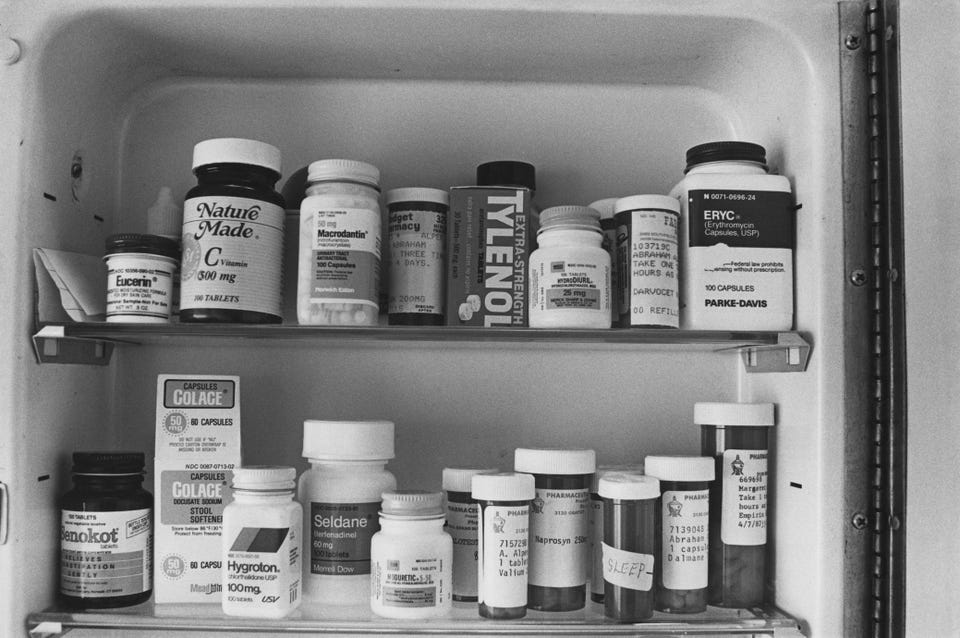Healthcare Two In Five Children In India Have No Access To Vitamin A Supplementation Anuradha Varanasi Contributor Opinions expressed by Forbes Contributors are their own. Anuradha writes about environmental health disparities & epidemiology New! Follow this author to improve your content experience. Got it! Jul 28, 2022, 08:00pm EDT | New! Click on the conversation bubble to join the conversation Got it! Share to Facebook Share to Twitter Share to Linkedin A domestic medicine cabinet containing, amongst other things, Tylenol, Colace, Senokot, Eucerin, .
. . [+] Hygroton, Seldane, Microdantin and Natural Made brand Vitamin C, USA, April 1988.
(Photo by Barbara Alper/Getty Images) Getty Images Around 190 million children below the age of 5 worldwide have vitamin A deficiency. In a new study published in the journal BMJ Global Health , a researcher based in India found that two in five Indian children have never received vitamin A supplementation — that could potentially keep children safe from developing health problems associated with vitamin A deficiency. Vitamin A is crucial for a child’s growth and development, vision, immunity, and wound healing process.
In his study, Dr. Kaustubh Bora from the ICMR Regional Medical Research Centre in India found that the glaring health disparities among different Indian states are associated with wide variations in terms of vitamin A supplementation coverage throughout India. While a balanced and healthy diet naturally provides young children with adequate vitamin A, malnutrition and poverty are more common in some Indian states as compared to others.
The World Health Organization recommends that children under the age of five who live in regions where Vitamin A deficiency is a public health issue should be given high doses of supplementation periodically. In India, the central government launched a policy in 2006 that recommends administering high doses of vitamin A supplements periodically to children below five years starting from the age of nine months. To assess how effective the policy has been in providing children access to supplementation, Bora analyzed data collected from 640 districts spread across 29 states during the National Family and Health Survey 4 (NFHS-4) and the Comprehensive National Nutritional Survey (CNNS) in 2015 and 2016.
MORE FOR YOU CDC: Salmonella Outbreak Has Left 279 Ill, 26 Hospitalized In 29 States Canadians End Up In ICU After Attending ‘Covid Party’ White House Mandates Pfizer Vaccines for Millions of Citizens . . .
Before the FDA Clinical or Safety Reviews Have Been Made Public The participants included 699,686 women and 112,122 men from 601 509 households. According to information that mothers provided the surveyors, Bora’s analysis found that two out of five eligible children had not received vitamin A supplements. That meant only 60% of the surveyed children aged between 9 months to 59 months were administered supplements.
Only two Indian states — Goa (89. 5%) and Sikkim (84. 3%) — reported over 80% coverage of supplementation.
Whereas a tribal state in northeastern India, Nagaland, reported the lowest coverage at 29. 5%. Other South Asian countries have far higher coverage of vitamin A supplementation in comparison.
While it is 96% in Pakistan and Afghanistan, around 85% of children under five in Nepal are administered vitamin A supplementation. “Although regarded as an important public health nutritional intervention, the usefulness of the dated vitamin A policy (that encourages the routine practice of universal vitamin A supplementation) is being increasingly questioned, with calls for more nuanced and sustainable alternatives,” wrote Bora in his study. “It is true that the coverage of Vitamin A supplementation, even in the recent past, was found to influence the prevalence of Vitamin A deficiency-related health problems like childhood blindness in some affected nations,” he added.
“But there are also concerns (in India and elsewhere) that the routine practice of administrating massive vitamin A doses indiscriminately has outlived its intended usefulness and that its further continuation may actually put children at risk of developing vitamin A toxicity. ” Follow me on Twitter . Anuradha Varanasi Editorial Standards Print Reprints & Permissions.
From: forbes
URL: https://www.forbes.com/sites/anuradhavaranasi/2022/07/28/two-in-five-children-in-india-have-no-access-to-vitamin-a-supplementation/



